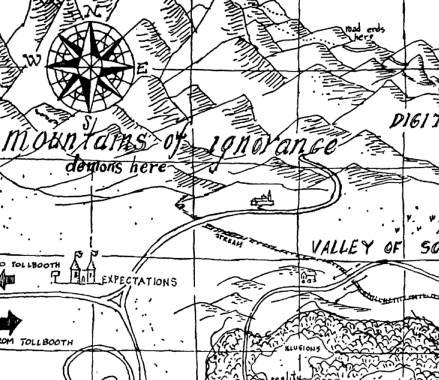'The Phantom Tollbooth,' or, The Democratizing Principle of Literature

“I am not talking to you now through the medium of custom, conventionalities, nor even of mortal flesh: it is my spirit that addresses your spirit; just as if both had passed through the grave, and we stood at God’s feet, equal-as we are!” -Charlotte Brontë, Jane Eyre
Some years back, my daughter wanted to attend a mommy-and-me girls’ reading group with her best friend, and I said okay, fine. It emerged that this was a “women of color” mommy-and-me girls’ reading group. I’m kind of honorary “of color,” because I am Cuban, though loads of my milk-white relations were born in Spain. I’ve often thought how bizarre the whole Hispanic thing is, because if you want a white European oppressor and/or pack of genocidal thugs who went around wreaking havoc on indigenous populations, well, Spain will give anybody a run for his money there, and yet we use “Hispanic” as a blanket term for the multi-colored descendants of both oppressors and oppressed. In any case, I rarely hesitate to lay claim to whatever demographic option will create the least fuss, because the whole thing seems so arbitrary anyway, and what I really wish is that everyone was treated fairly and there were no boxes left to tick.
This best friend’s mama had been a great mate of mine since way back in our Lamaze days. Diana is a terrific force of nature, a lawyer of great toughness and moral fiber, or really more like, moral rebar; part African-American, part Native American and part Klingon, we used to say. The two of us had been Lamaze renegades who’d had no truck with the whole la-la-la-the-life-within-me thing of “expecting” (ridiculous word). We laughed openly at the hard-sell tactics used to promote this idea that we must endure an “unmedicated” childbirth and must never ever listen to any doctors or we’d be betraying our Babies, our Nation and Women. We spent half the class joking about how soon we could demand oodles of morphine when The Time Came, etc.
“Hey, I am just trying to avoid a natural death experience, ha ha!” we’d say. “Wake me when the hairdresser arrives!”
Anyway, my daughter and I went along to the mommy-and-me women-of-color book group. It was fun, these lovely women and their daughters, this beautiful house. We all gabbed and had snacks for a while. Later on, I was asked to recommend a book for the girls to read, for next time, and I instantly suggested The Phantom Tollbooth.
THEM (uncomfortable)
“Uh, is that written by a woman of color?”
ME (oblivious)
“Oh God, no.”
THEM
“Is the hero a minority?”
ME (a light dawns)
“No, no, oh no. Um. A boy, Milo, and a talking dog.”
(while wildly thinking how talking dogs constitute very small underclass)
THEM
“Is the writer a minority?”
ME
“No, no! A white guy! This total white guy. I think from New York, or something?”
THEM (patronizing as hell)
“Well, we want the girls to be able to identify with the characters…”
ME (bristling)
“Listen, I have been identifying with Milo since I was eight years old myself. Are you trying to teach these girls that they can’t identify with Milo?”
Of all the dumb things to get into a tussle about. But I found I couldn’t quite wriggle out of it, because it really did drive me wild that these girls weren’t going to be encouraged to read The Phantom Tollbooth. My daughter was embarrassed to see me getting into an actual disagreement with these nice Moms. It might have gotten really awkward but for Diana, who managed with her usual raised eyebrow or two to smooth everything out.
Even so, we never went back, and I often recall the frustration I felt that afternoon.
I cannot help but think that it is flat wrong to teach anyone that he or she should not read, or love, or identify with, any book he or she pleases. Indeed, to my own way of thinking, that’s the whole point of literature. David Foster Wallace had a lovely thing to say in this regard, about Cynthia Ozick.
Here’s what’s cool is that this is this hyper-educated, very seriously Jewish person writing about a culture and ethnicity that I know very slightly, and mostly only from books, and whom I-number one, the prose is just completely luminous, but number two, I find myself feeling stuff for these folks that I sure don’t feel for most of the people who look just like me in regular life.
Literature’s a democratizing force. Its power makes so much of the world accessible to anyone who can read, equally, without regard to anything about “who we are” or where we came from or any of that. If you want to participate in the world of letters, all that matters is your ability to make yourself intelligible, when you write, and to apprehend what is being said, when you read.
It doesn’t matter whether an author is a Great White Author, or a minority author, or anything like that. As a reader, I don’t care if you are a woman of color, a white man or a Lhasa Apso. I only care whether or not your book is any good.
Maria Bustillos is the author of Dorkismo: The Macho of the Dork and
